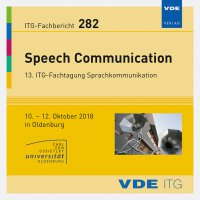Diagnostic and Summative Approach for Predicting Speech Communication Quality in a Super-Wideband Context
Conference: Speech Communication - 13. ITG-Fachtagung Sprachkommunikation
10/10/2018 - 10/12/2018 at Oldenburg, Deutschland
Proceedings: Speech Communication
Pages: 5Language: englishTyp: PDF
Personal VDE Members are entitled to a 10% discount on this title
Authors:
Moeller, Sebastian (Quality and Usability Lab, Technische Universität Berlin, Berlin, Germany & Language Technology, Deutsches Forschungszentrum für Künstliche Intelligenz (DFKI), Berlin, Germany)
Huebschen, Tobias; Schmidt, Gerhard (Digital Signal Processing and System Theory (DSS), Christian-Albrechts-Universität zu Kiel, Kiel, Germany)
Mittag, Gabriel (Quality and Usability Lab, Technische Universität Berlin, Berlin, Germany)
Abstract:
The quality of speech transmitted through narrowband (300-3400 Hz) and wideband (50-7000 Hz) networks has been a topic of investigation for decades, and models which predict passively experienced transmission quality as well as interactive communication quality are largely available. With the advent of super-wideband (20-14000 Hz) speech communication services, the influence factors of the underlying systems change, and new prediction models become necessary to adequately plan and monitor the resulting quality. Whereas a model for predicting overall listening-only quality in such situations is readily available and standardized, we propose a new framework for predicting speech communication quality as well as its underlying perceptual dimensions and technical root causes of degradations from signals and/or parameters from the network and terminals. The framework offers diagnostic as well as summative information for network planning, optimization and monitoring.


